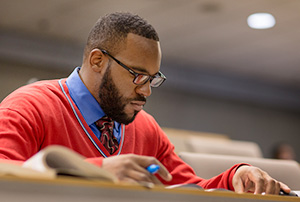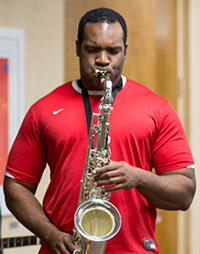

Becoming a Doctor
Pipelines to Success: A Dream Becomes Reality
Growing up in Spring Valley, NY, Kevin Frison often dreamed of becoming a physician. When he was in elementary school, his mother, a nurse at a nearby hospital, would bring home her nursing books and magazines, and pamphlets left behind by pharmaceutical reps. "I read everything," recalled Mr. Frison, now a second-year student at Einstein.

Hitting the booksWhen his parents divorced when he was 10, Kevin and his younger brother went to live with their father, a social worker. Since both parents worked full time, his mother would bring Kevin to the hospital after school, where he would watch the nurses and doctors work.
Throughout grade school and high school, he excelled at academics. "Everything seemed to come easy for me," he said. He also made the basketball team and played saxophone in the all-district and all-county bands.
An Introduction to Pipeline Programs
One day, Mr. Frison, who is African-American, noticed an application in his guidance counselor's office for the State Pre-College Enrichment Program, better known as S-PREP—one of many government-funded "pipeline" programs that encourage economically and educationally disadvantaged students who are underrepresented in the healthcare professions, to pursue health-related careers. He applied and was accepted. He also was excused from weekend basketball and band practices so he could attend anatomy and physiology class every Saturday morning.
"S-PREP opened the door to my passion for medicine and increased my desire to become a doctor," he said.

Mr. Frison also plays his sax in the Einstein Jazz EnsembleLater, as an undergraduate at SUNY Albany, he joined the Collegiate Science and Technology Entry Program, or C-STEP. "Through C-STEP, I got my first laboratory research experience and gained a greater appreciation for the sciences," he noted.
Learning About Healthcare Firsthand
Following college, Mr. Frison planned to work and study for the MCAT. But life had other plans. One morning, his father woke up in excruciating pain, and had difficulty getting out of bed, walking and standing.
"Everything went downhill from there," said Mr. Frison. For months, he drove his father to the hospital for MRIs and X-rays. The diagnosis: lumbar osteomyelitis. His dad could no longer work.
Because Medicaid would only pay for a part-time aide, Mr. Frison became his father's primary caregiver. When his dad developed a sacral pressure ulcer, he cleaned and packed it daily. And he assisted his father in dealing with other medical issues, including diabetes, kidney disease, prostate cancer and high cholesterol. He managed his father's meds, bathing and dressing him, and driving him to dialysis three times a week.
"It was a very stressful time," he recalled. "But my mom was there for me emotionally and financially. She understood the challenges of getting into medical school."
To help make ends meet, Mr. Frison worked as a substitute science teacher for two years at Ramapo High School, his alma mater. During that time, a local physician introduced him to Dr. Lynne Holden, associate professor of clinical emergency medicine at Einstein and founder/ director of Mentoring in Medicine (MiM), a program whose aim is to improve diversity in medicine.
Influential Mentors
Through MiM's 20-week Medical Pathways Program, Mr. Frison learned effective study and test-taking techniques and gained hands-on experience at Montefiore Medical Center, Einstein's University Hospital, and Jacobi Medical Center. Dr. Holden, who he considers a key mentor, recalled, "Kevin stood out. His sensitivity and compassion really struck me."
Dr. Holden introduced Mr. Frison to Dr. Irwin Dannis, who recently retired as a co-chair of admissions at Einstein, and to Nilda I. Soto, assistant dean for diversity enhancement. "They were very supportive," he recalled. "And, through them, I learned how awesome Einstein is."
After interviewing at Einstein, Mr. Frison was invited to attend Associated Medical Schools of New York's Post Baccalaureate Program in Buffalo, NY. "Before the post-bac, I thought I was ready for medical school," he said. "After the post-bac, I knew I was ready."
"Einstein is about humanism and collaboration," said Dr. Holden. "Kevin exudes those qualities. He's a leader who's also a team player. Whenever he has time, he comes and speaks to our MiM students about his journey and how he handled challenges."
Last spring his peers recognized his leadership and commitment by electing him president of Einstein's chapter of the Student National Medical Association. "Kevin is someone who wants to make a difference as a physician, who will advocate for his patients," noted Ms. Soto.
While he is currently undecided about what his specialty will be, Mr. Frison's future looks bright. "The pipeline process was a blessing in my life," he said. "My mentors have given me the confidence I needed to succeed."
Posted on: Tuesday, March 18, 2014

Tablet Blog